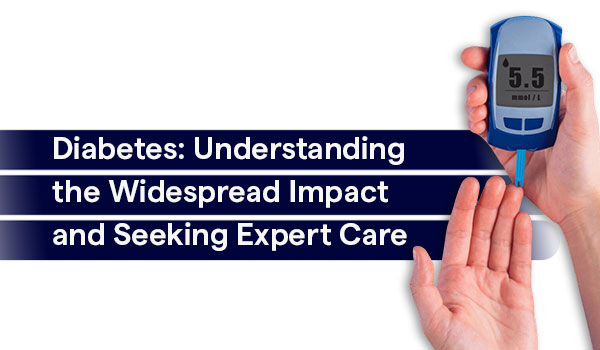
Diabetes Symptoms:
Diabetes is a chronic health condition that affects how your body turns food into energy. There are three main types of diabetes: type 1, type 2, and gestational diabetes.
Type 1 Diabetes Symptoms:
Type 2 Diabetes Symptoms:
Symptoms of gestational diabetes:
It's critical to understand these diabetes symptoms and get advice from them.
One of the major areas commonly affected by diabetes is the small blood vessels, such as the kidneys and eyes. The high blood sugar levels associated with diabetes can cause major damage to these delicate blood vessels, leading to conditions such as diabetic nephropathy and diabetic retinopathy. Diabetic nephropathy affects the kidneys' ability to filter waste from the blood, while diabetic retinopathy can even result in vision problems and even blindness.
In addition to the small blood vessels, it also impacts the larger blood vessels in the body, which can have severe consequences for major parts like the heart and brain. Elevated blood sugar levels significantly increase the risk of cardiovascular diseases, including heart attacks and strokes. It is a major contributing factor to the development of these mentioned conditions.
Managing blood sugar levels is paramount in preventing and minimizing the impact of diabetes-related problems. By keeping blood sugar levels within the target range, individuals can significantly reduce the risk of diabetes problem. This requires regular monitoring of blood sugar levels and strictly following the given personalized treatment plan, which may include a combination of medication, lifestyle, and dietary changes.
As a diabetes patient, it is essential to prioritize regular check-ups and tests, particularly during increased pollution and in the winter season.
The Department of Endocrinology of Sir Ganga Ram Hospital strongly advises regular consultations with healthcare professionals to monitor blood sugar levels and evaluate overall health. These tests help identify any potential complications early on, allowing for timely intervention and management.
In conclusion, It directly impacts various parts of the body. However, by working closely with the Endocrinology hospital in Delhi, individuals with diabetes can effectively manage these complications and minimize their impact. Maintaining proper blood sugar control, following a treatment plan, and seeking regular medical advice are crucial steps towards reducing the risk and impact of these complications. Diabetes patients must prioritize their health, particularly during times of increased pollution and in the winter season.
Don't let diabetes control your life. Take control and protect yourself with expert care at Sir Ganga Ram Hospital. Book an appointment today and take the first step towards a healthier future.




